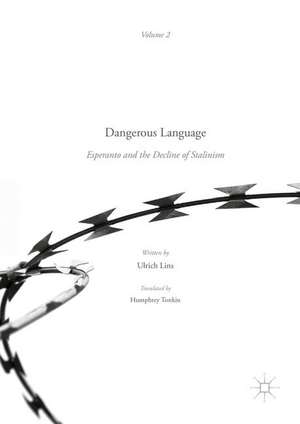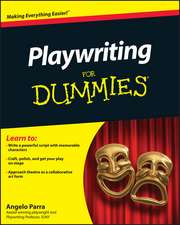Dangerous Language — Esperanto and the Decline of Stalinism
Autor Ulrich Lins Traducere de Humphrey Tonkinen Limba Engleză Hardback – 19 feb 2017
This is Volume 2 of Dangerous Language. This book examines the rise of the international language Esperanto, launched in 1887 as a proposed a solution to national conflicts and a path to a more tolerant world. The chapters in this volume examine the position of Esperanto in Eastern Europe during the Cold War; in particular it explores Stalin’s final years and the gradual re-emergence of the Esperanto movement. At first, its revival was limited to the satellite countries, especially Bulgaria and Poland, but, with Stalinism’s gradual retreat, Esperanto organizations reappeared in most East European countries and eventually in the Soviet Union itself. The progress was uneven, and its details reveal the stresses and strains that became apparent as the solidarity of the Soviet bloc declined. This book will appeal to a wide readership, including linguists, historians, political scientists and others interested in the history of the twentieth century from the unusual perspective of language. This volume is complemented by the sister volume Dangerous Language — Esperanto under Hitler and Stalin which offers a concentration on the creation and early emergence of Esperanto as an international language.
| Toate formatele și edițiile | Preț | Express |
|---|---|---|
| Paperback (1) | 210.55 lei 43-57 zile | |
| Palgrave Macmillan UK – 14 iul 2018 | 210.55 lei 43-57 zile | |
| Hardback (1) | 583.78 lei 43-57 zile | |
| Palgrave Macmillan UK – 19 feb 2017 | 583.78 lei 43-57 zile |
Preț: 583.78 lei
Preț vechi: 686.79 lei
-15% Nou
Puncte Express: 876
Preț estimativ în valută:
111.71€ • 116.93$ • 92.97£
111.71€ • 116.93$ • 92.97£
Carte tipărită la comandă
Livrare economică 31 martie-14 aprilie
Preluare comenzi: 021 569.72.76
Specificații
ISBN-13: 9781352000191
ISBN-10: 1352000199
Pagini: 180
Ilustrații: XIX, 198 p. 22 illus., 2 illus. in color.
Dimensiuni: 148 x 210 x 14 mm
Greutate: 0.41 kg
Ediția:1st ed. 2017
Editura: Palgrave Macmillan UK
Colecția Palgrave Macmillan
Locul publicării:London, United Kingdom
ISBN-10: 1352000199
Pagini: 180
Ilustrații: XIX, 198 p. 22 illus., 2 illus. in color.
Dimensiuni: 148 x 210 x 14 mm
Greutate: 0.41 kg
Ediția:1st ed. 2017
Editura: Palgrave Macmillan UK
Colecția Palgrave Macmillan
Locul publicării:London, United Kingdom
Cuprins
- PART I: THE DEATH OF ESPERANTO IN THE SOVIET UNION.- Chapter 1: The events of 1937-38.- Chapter 2: Esperantists in the Great Purge.- Chapter 3: The emergence of Soviet patriotism.- Chapter 4: International correspondence.- Chapter 5: Silence descends.- PART II: ESPERANTO REBORN.- Chapter 6: After the Second World War: The Great Silence in Eastern Europe.- Chapter 7: Stalin against Marr.- Chapter 8: The needs of the present.- Chapter 9: Revival of the movement.- Chapter 10: Eastern Europe: progress and problems.- Chapter 11: The Soviet Union: between hope and doubt.- PART III: CONCLUSION.- Chapter 12: Conclusion: Dangerous Language or Language of Hope?.
Notă biografică
Ulrich Lins received his doctorate at the University of Cologne, Germany, with a dissertation on Japanese nationalism (published in 1976). For thirty years he worked for DAAD, the German Academic Exchange Service in its headquarters in Bonn, and served two tours of duty as head of its office in Tokyo. He has edited numbers of books in German and Japanese on German-Japanese relations and on Germany following reunion. The present volume, written originally in Esperanto, has appeared in German, Italian, Japanese, Korean, Russian, and Lithuanian translations.
Humphrey Tonkin is President Emeritus of the University of Hartford, USA, where he served as University Professor of Humanities. He studied English and comparative literature at Cambridge and Harvard (Ph.D. 1966) and has written widely on literary topics and on international education and language policy. He has published numbers of translations from English to Esperanto and from Esperanto to English.
Textul de pe ultima copertă
This book examines the rise of the international language Esperanto, launched in 1887 as a proposed a solution to national conflicts and a path to a more tolerant world. The chapters in this volume examine the position of Esperanto in Eastern Europe during the Cold War; in particular it explores Stalin’s final years and the gradual re-emergence of the Esperanto movement. At first, its revival was limited to the satellite countries, especially Bulgaria and Poland, but, with Stalinism’s gradual retreat, Esperanto organizations reappeared in most East European countries and eventually in the Soviet Union itself. The progress was uneven, and its details reveal the stresses and strains that became apparent as the solidarity of the Soviet bloc declined. This book will appeal to a wide readership, including linguists, historians, political scientists and others interested in the history of the twentieth century from the unusual perspective of language. This volume is complemented by the sister volume Dangerous Language — Esperanto under Hitler and Stalin which offers a concentration on the creation and early emergence of Esperanto as an international language.
Caracteristici
Examines in depth that sad fate of the internationalist movement for a new world language, Esperanto
Offers the reader insight into archival materials documenting the persecution and mistreatment of the speakers and supporters of Esperanto in the modern ideological landscape of the 20th century
Uncovers the resurrection of Esperantism in the late Soviet period, suggesting its contribution to the downfall of the Soviet Union
Offers the reader insight into archival materials documenting the persecution and mistreatment of the speakers and supporters of Esperanto in the modern ideological landscape of the 20th century
Uncovers the resurrection of Esperantism in the late Soviet period, suggesting its contribution to the downfall of the Soviet Union











